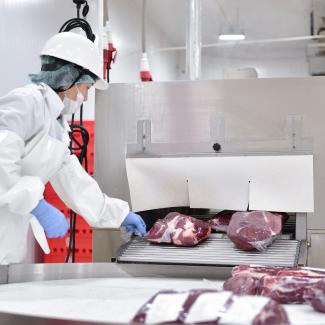Kristina Shoh, 26, is a single mother of two living in Malik Gabdullin village, three hours outside of Kazakhstan’s capital Nur-Sultan. She works for KazBeef Holding, an American-Kazakh joint venture and a leading beef producer in Kazakhstan and Central Asia. Her responsibilities include keeping farmer records and documenting calves taken to the feedlot. Kristina is also an entrepreneur – for an additional income, she and her mother run a small farm with 40 cows and calves.
Over 1,000 farmers supply KazBeef with calves, representing the start of the beef supply chain; Kristina is one such farmer. KazBeef Holding represents the next ‘link’ in the chain. Across the supply chain, the output of the first participant becomes the input for the next producer, and the quality of the final product is the shared result. For this reason, all participants must ensure high-quality production, wherever they fall along the chain. “Farmers appreciate having a reliable partner like KazBeef,” says Kristina. “We are working hard to sell them healthy and happy calves.”
After the holding company buys purebred calves from farmers, it further fattens the young cattle before sending it to the meat plant. KazBeef strives to adopt beef industry best practices from the United States in Kazakhstan. These include compliance with responsible food safety and environmental practices across the whole supply chain. Proper care of both cattle and the environment is an essential requirement for farmers to secure contracts with KazBeef.
To support this approach, USAID has supported KazBeef’s preparation for Global Good Agricultural Practices (G.A.P.) Certification. The certification shows consumers that a company produces high-quality and sustainable food products, which they can buy with confidence. The certification ensures that agribusiness practices are consistent with upwards of 40 industry standards related to food safety and traceability, environmental protection, worker health and safety, and animal welfare.
These food safety and traceability standards signal that food products are safe to eat and that health and sanitation requirements are in place through all stages of production, processing, and distribution. Environmental standards help ensure that business activities support the environment and preserve natural resources, social standards ensure the comfort and safety of workers, and animal welfare standards ensure that animals’ social interaction, comfort, and physical and psychological wellbeing are considered.
“We are very proud to be the first-ever company in Kazakhstan to earn GLOBAL G.A.P. Certification,” says Beibit Yerubayev, CEO of KazBeef Group. “This will have a long-lasting impact on the whole supply chain, and ultimately will reach our peers from meat and other industries.” Indeed, the certification will not only improve the long-term business performance of KazBeef but also demonstrates to farmers and other companies that adherence to GLOBAL G.A.P. standards contribute to increased sales and cost efficiencies.
Since the traceability component of KazBeef’s GLOBAL G.A.P. Certification requires the provision of animal identification information, the farmers supplying calves must take good care of animals and their environment. “I always make sure that my animals have good food and water as well as dry and clean pens,” says Kristina. “I wash my hands and change my shoes and clothes before and after contact with animals. To prevent disease, I vaccinate them, consult with veterinary experts regularly, and manage waste properly.”
According to Beibit, “The certification requires us to buy only healthy and well-groomed calves. So, both the farmers and KazBeef are interested in maintaining high quality meat products to secure good sales on their end in particular, and across the whole supply chain in general.” Kristina also notes that farmers are motivated to meet the company’s high standards. “We understand that it will mean increased responsibility for us, but we are ready to take it on,” she says. “KazBeef buys our calves at the fair market price, and it is a mutually beneficial relationship.” Thus, the KazBeef supply chain is a win-win situation for each participant.
USAID supports its partners in earning internationally recognized certifications, such as Global G.A.P., allowing businesses to enter higher value global markets. With the Global G.A.P. Certification, Kazbeef has more influence over both ends of its supply chain.
The certification requires adherence to KazBeef’s process and quality standards, and this is communicated to buyers and end consumers. Farmers benefit from increased sales and improved practices. Customers in Kazakhstan and abroad benefit from high-quality beef. Peers in the meat sector and other industries will observe the benefits of a high-quality system of environmental social and governance standards, and follow KazBeef’s example.

USAID's Future Growth Initiative
